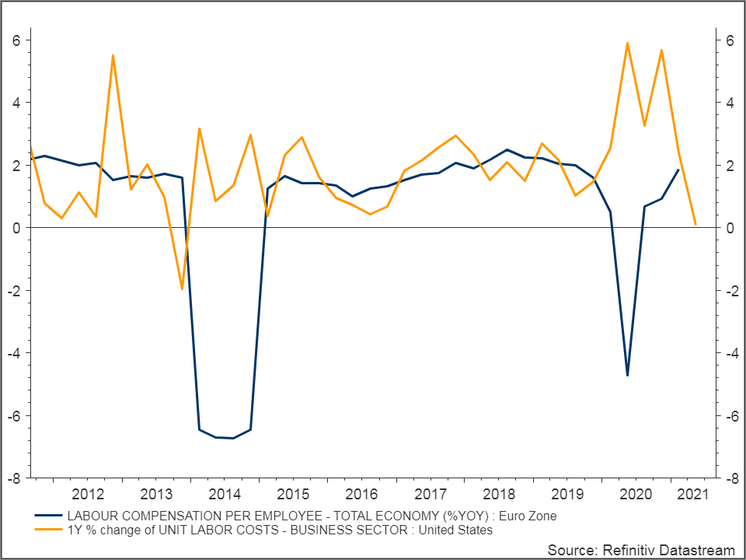Navigation
Fermer
Equity Research


As the most immediate effects of the standstill brought on by the pandemic subside, there are signs that we may be entering a periodthat will be affected by a differing series of dynamics from those observed prior to 2020. The rate of recovery of demand for certain products has not been in step with that of recovery of supply, as has become apparent with the recent widespread upturn of prices.
Specifically, we have focussed our attention on staple products, such as most metals, commodities, intermediate raw materials and production factors; here we see a robust and widespread uptrend that has not yet stabilised.
Chart 1. Industrial PPI in Eurozone and final demand PPI in the US. 2011–21

At Mirabaud, we believe that few industries will remain unaffected by the resulting impact of the uptrend, although some are facing much higher exposure than others. Specifically, this means industries such as contracting, including civil-engineering firms and developers of energy-related projects (renewable and otherwise), construction and the manufacturing of certain types of capital goods.
Bridge construction in Colombia

In these lines of business, margins are very tight and parties executing projects assume grave operating and economic risks, depending on the circumstances and the type of contract. In the past, especially in the last five years, we have seen great volatility in margins and in generation of cash in this industry, the result of fierce competition among rivals and greater sophistication of customers. Considering the performance of the aforementioned factors and the nature of the business, we believe that the coming quarters will constitute a critical period for contractors.
The challenge that contractors face lies in their budgetary leeway when entering into supply contracts and how they will deal with variance, which will almost certainly see an upturn. For contractors, this risk will be covered only in projects in which customers assume variance and in other cases in which revision of end prices is left open and is to be determined on the basis of procurement costs. In all other circumstances, contractors stand to be exposed to this risk. At Mirabaud, we expect to see risk of downward revision in reported margins and therefore in reported generation of cash, with isolated significant upturns in working capital during project execution. To date, industry players have addressed the matter in rather vague terms.
Labour is a key element that has shown no signs of inflationary pressure to date (see chart). However, EU member states are showing signs of a widespread increase in the prices of goods (not only of energy), and, if this becomes a trend, it will very likely end up affecting this production factor of contractors. Similarly, at Mirabaud, we believe that investment in capital goods and machinery required for the execution of assets under development may perform along the same lines and ultimately reflect the context of higher prices.
Chart 2. YoY variation in labour compensation. Eurozone and the US. 2011–21
In addition, we expect to see an upturn in contracting in the coming months, in view of economic-recovery programmes to be implemented on both sides of the Atlantic. How the new contracts are drawn up and how they are executed will be key factors in ensuring a minimum of profitability and the sustainability of the industry.
Therefore, it should come as no surprise that some of the groups directly exposed to these undertakings have given clues as to their plans for the medium term. The clearest examples of this are ACS and Ferrovial, which have chosen to abandon their activities in the industry.
This was clearly seen in the case of ACS and the company’s announcement that it would sell Cobra, its most important unit and one of the leading contractors of industrial services. ACS may have taken this decision either due to the industrial unit’s prospects failing to pan out, because of a lack of critical mass or because it could not turn down Vinci’s offer. The disposal of Ferrovial involves an undertaking in a line of business with much less risk (urban and environmental services) that has been up for sale since 2018.
It is significant that two of the industry’s biggest and most prestigious players worldwide have chosen to retreat. It must be observed that both have taken steps toward gaining presence in the management of infrastructure assets, which is a completely different line of business. Such assets are highly capital intensive, duration is much longer, there is greater operating leverage to volumes and prices and it constitutes a natural hedge against inflation. Clearly, ACS and Ferrovial have opted to position themselves on the other side of the matter, although they have maintained their undertakings in construction and execution of civil engineering, due to the complementarity and synergies that contribute to their core activities. Nonetheless, it is difficult to consider these companies’ core activities, or at the very least, they are no longer comparable to those maintained by rival groups such as Vinci, Skanska, Eiffage and Sacyr.
It is likely that the sector will see a considerably less orderly managed post-pandemic situation for the industry than previously expected. And, with regards the near future, many will surely avoid exposure to companies with thin margins that may be subject to the impact of the aforementioned dynamics of production factors, especially those with the greatest exposure to contracting.
N'hésitez pas à vous adresser à votre interlocuteur privilégié chez Mirabaud ou à nous contacter ici si ce sujet vous intéresse. Avec nos spécialistes dédiés, nous nous ferons un plaisir d'évaluer vos besoins personnels et de discuter des éventuelles solutions d'investissement qui seraient adaptées à votre situation.
Continuer vers
Equity Research
Equity Research